Pathophysiology and Transmission of E. coli

E coli symptoms – Escherichia coli (E. coli) is a diverse group of bacteria commonly found in the gut of warm-blooded animals, including humans. While most E. coli strains are harmless, certain pathogenic strains can cause a wide range of infections, including gastrointestinal, urinary tract, and bloodstream infections.
E. coli symptoms can range from mild to severe, including abdominal cramps, diarrhea, and fever. In severe cases, it can lead to kidney failure and even death. Fortunately, most cases are not life-threatening. For more information on E.
coli and its symptoms, please visit the website of Pope Francis. There you will find detailed information on E. coli and other health-related topics.
E. coli infection typically occurs through the ingestion of contaminated food or water. The bacteria can also be transmitted through contact with infected animals or their feces. Once ingested, E. coli colonizes the gastrointestinal tract, where it can produce toxins that damage the intestinal lining and cause symptoms such as diarrhea, abdominal pain, and nausea.
E. coli infection can cause severe abdominal cramps, diarrhea, and fever. The bacteria can also lead to kidney failure and other serious health problems. If you suspect you have an E. coli infection, it’s important to seek medical attention immediately.
Meanwhile, you can find out more about Antony Starr’s role in Xena: Warrior Princess here. The actor portrayed a character named Ares, the Greek god of war. E. coli infections can be prevented by practicing good hygiene, such as washing your hands frequently and cooking food thoroughly.
Strains of E. coli, E coli symptoms
There are several different strains of E. coli, each with its own unique virulence factors. Some of the most common pathogenic strains include:
- Enteropathogenic E. coli (EPEC): EPEC is a common cause of diarrhea in children in developing countries. It produces a toxin that damages the intestinal lining, leading to watery diarrhea.
- Enterotoxigenic E. coli (ETEC): ETEC is a major cause of traveler’s diarrhea. It produces toxins that stimulate the production of water and electrolytes in the intestine, leading to watery diarrhea.
- Enteroinvasive E. coli (EIEC): EIEC is a less common strain of E. coli that invades the intestinal lining, causing symptoms similar to those of shigellosis, including bloody diarrhea.
- Enterohemorrhagic E. coli (EHEC): EHEC is a particularly virulent strain of E. coli that produces a toxin called Shiga toxin. Shiga toxin can damage the lining of the intestine and the kidneys, leading to bloody diarrhea and a potentially life-threatening condition called hemolytic uremic syndrome (HUS).
Clinical Manifestations of E. coli Infection

E. coli infections manifest a wide range of symptoms, depending on the strain of bacteria and the site of infection.
Gastrointestinal manifestations are the most common, characterized by:
– Diarrhea, often bloody
– Abdominal cramps
– Nausea
– Vomiting
– Fever
Urinary tract infections (UTIs) are another common manifestation, causing:
– Dysuria (painful urination)
– Frequency
– Urgency
– Hematuria (blood in urine)
Systemic infections, though less common, can be severe and life-threatening, including:
– Sepsis
– Meningitis
– Pneumonia
– Hemolytic uremic syndrome (HUS)
The incubation period for E. coli infection ranges from 12 hours to 5 days. Symptoms typically last 3-5 days but can persist for longer in severe cases.
Diagnostic and Treatment Approaches for E. coli Infection: E Coli Symptoms

Diagnosing and treating E. coli infections involve a combination of laboratory tests and therapeutic interventions. This section explores the diagnostic methods used to identify and confirm E. coli infection, along with the various treatment options available.
Diagnostic Methods
Confirming an E. coli infection requires laboratory tests to detect the presence of the bacteria in various body fluids or tissues. These tests include:
- Stool cultures: A sample of stool is collected and analyzed to identify the presence of E. coli bacteria.
- Urine analysis: A urine sample is examined for the presence of bacteria, including E. coli, which can indicate a urinary tract infection.
- Blood tests: Blood samples can be tested to detect antibodies produced by the immune system in response to E. coli infection.
Treatment Options
Treatment for E. coli infections depends on the severity of the infection and the specific strain of E. coli involved. Common treatment options include:
- Antibiotics: Antibiotics are the primary treatment for E. coli infections. They work by killing or inhibiting the growth of the bacteria.
- Fluids: Adequate fluid intake is crucial for treating E. coli infections, especially those causing diarrhea or vomiting.
- Supportive care: Rest, electrolyte replacement, and pain relievers may be recommended to manage symptoms and support recovery.
E. coli infections can manifest in various ways, including abdominal cramps, diarrhea, and nausea. Seeking medical attention promptly is crucial to rule out more severe complications. However, if you’re looking for a momentary distraction from your discomfort, exploring mlb records can provide a temporary escape.
Whether it’s marveling at the all-time home run leaders or witnessing incredible pitching performances, the world of baseball offers a brief respite from the physical discomfort. Nevertheless, don’t neglect your health; remember to consult a doctor if your symptoms persist.
E. coli infections can cause a range of symptoms, including diarrhea, abdominal cramps, nausea, and vomiting. These symptoms can be severe and may require medical attention. For those who are looking for more information about the latest sports news, check out the steph finals mvp article.
Returning to the topic of E. coli, it’s important to seek medical advice if you experience any of these symptoms, as early diagnosis and treatment can help prevent serious complications.
E. coli infections can cause a range of symptoms, including abdominal pain, diarrhea, and fever. In severe cases, they can even lead to kidney failure. But did you know that baseball legend Barry Bonds was once accused of using performance-enhancing drugs that contained E.
coli? While the charges were eventually dropped, they serve as a reminder that even the most celebrated athletes are not immune to the dangers of E. coli.